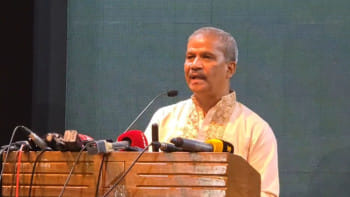Minister vows to strengthen TCB
The government is trying to arm Trading Corporation of Bangladesh (TCB) with monetary and legal facilities to put a tab on the skyrocketing prices of essential commodities, said the commerce minister yesterday.
“We are trying hard to keep the prices of commodities stable in the market. We are strengthen-ing TCB further so it can intervene when profiteers make people suffer by controlling the supply and increase prices of commodities like edible oil or sugar,” said GM Quader.
“But we would also make sure that the genuine businessmen can do business, and the market would be friendly to businessmen. However, we want to break the oligopoly and monopoly created in the market over the trade of major commodities as well,” he added.
He was addressing his first press meet after taking charge of the ministry in Dhaka Reporters Unity (DRU).
As part of strengthening TCB, the government has undertaken moves to increase the storage capacity of the state owned organisation, so it can conserve farm products and commodities.
“We'll hire storages from the food department in different districts and will build some new structures wherever needed as well. Sufficient storage will help tackle the situation when supply gets hampered.”
“TCB can then intervene in the market when demand rises and supply is poor, for example in Ramadan,” said the commerce minister.
The ministry placed the draft competition law in parliament, which is likely to be approved in the next session, said Quader.
“At present, we don't have any strong laws to control the oligopolies and monopolies of some profiteering businessmen. We hope the Competition Law will help reduce market manipulation and artificial crisis,” Quader added.
An oligopoly is a market dominated by a few large suppliers and a few firms selling similar products. Oligopoly firms collaborate on prices to keep them higher than regular market prices for larger profits.
Quader said only a handful of businessmen are now controlling the huge market for edible oil and sugar.
The size of the edible oil market is worth Tk 1,000 crore a month, he said.
Simultaneously, the government is also planning to incre-ase the allocation of money for TCB so that it can further increase its buying capacity and ensure a good stock of essential commodities.
“We would provide subsidies if needed in this regard.”
The government is all set to ensure an adequate supply of commodities like edible oil, sugar, date, and chickpeas before the month of Ramadan, so that corrupt traders cannot make the market volatile with irrational prices, said the minister.
He stressed enhancing and diversifying the export basket and increasing export destinations, which will eventually boost earnings.
In response to a query, the minister said the report on Destiny prepared by the commerce ministry has been sent to the cabinet for evaluation.
The country exported products worth $23 billion, while it imported goods and services worth $32 billion in 2010-11, he added.
However, Quader feared that the trade imbalance may rise further because petroleum oil prices are still rising on the international market, which may rise further due to unrest in the Middle East.
“And for that, along with increasing local production, there is no alternative to enhancing the export basket and increasing the destinations beyond the US, EU, Japan and Canada.”
Shakhawat Hossain Badsha, president of DRU, and Sajjad Alam Khan Topu, secretary, were also present.

 For all latest news, follow The Daily Star's Google News channel.
For all latest news, follow The Daily Star's Google News channel. 



Comments